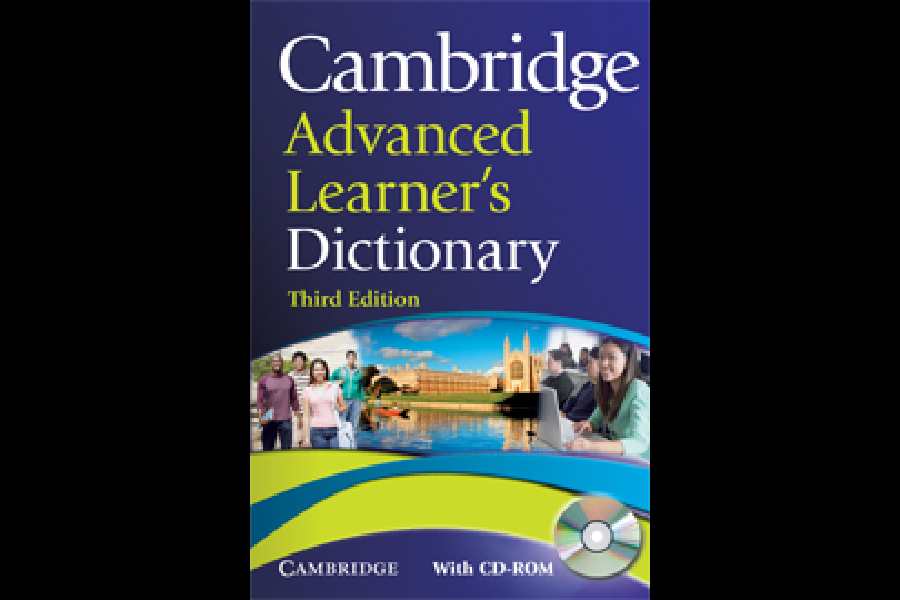Unique tongue
Sir — IYKYK (if you know, you know). And if you do not know, the Cambridge Dictionary can come to your rescue. It has added 3,200 new words and phrases — such as ‘IYKYK’, ‘the ick’ (sudden dislike or disgust), ‘boop’ (gentle, affectionate touch on the nose), ‘chef’s kiss’ (perfect) and several others — that are used by Gen Z to the dictionary. The Cambridge Dictionary will now be the go-to source for older generations who think that Gen Z speaks in a language that is incomprehensible. While such a casual attitude to language, even in the most serious of settings, is usually frowned upon, surely the unique frustration of growing up in a time of great instability — a pandemic, wars and record-high unemployment and temperatures — demands a unique vocabulary.
Payal Ghosh,
Calcutta
Beyond binaries
Sir — The Algerian boxer, Imane Khelif, is creating waves since her Italian opponent, Angela Carini, quit after taking several blows to the face in the first 46 seconds of her bout with the former. Born in 1999, Khelif has been boxing since she was a child and has always competed in women’s categories. But she has been targeted and misgendered throughout the Paris Olympics. False claims that she is a transperson or that she is a man pretending to be a woman spread quickly thanks to reports that she was disqualified from a 2023 International Boxing Association event and the resurfacing of comments by the president of that organisation suggesting that her elimination was because she failed a hormone test.
The controversies of the past few days have taken serious issues such as hyperandrogynism (the excessive production of testosterone by female bodies) and intersexuality (someone born with sex characteristics that do not fit neatly into traditional definitions of male and female) and debased them. They also further poisoned an already sensitive debate around transgender women’s participation in the Olympics and in sports competitions in general.
Prerona Das,
Calcutta
Sir — The controversy regarding Imane Khelif goes beyond questions of gender. There are racial dynamics at play in the perceptions being peddled on social media. Female athletes of colour, particularly those of African and African-American descent, have long been accused of being men when they have beaten white women in competitions. This happened most notably with the tennis phenomenon, Serena Williams, and the track star, Caster Semenya, both of whom endured tropes that cast black women as more masculine and threatening. Khelif’s success proved to be an opportunity for those with transphobic views to score rhetorical and political points.
Wasiullah Khan,
Mumbai
Hypocritical stance
Sir — The editorial, “Central lesson” (Aug 4), rightly drew attention to the Union education minister’s endorsement of the Emergency-era decision of transferring education from the state list to the concurrent list. While the Bharatiya Janata Party often vociferously deplores the Emergency, its endorsement of autocratic decisions is the perfect example of its hypocrisy.
What the editorial does not mention is that states should also be given the economic means to implement their own educational policies. Under the present system, the states have to depend on the Centre for financial grants. In a federal structure, the status and the dignity of governments in the states and at the Centre should be the same.
Sukhendu Bhattacharjee,
Hooghly
Strange sight
Sir — State-sponsored public art initiatives along the streets merit interrogation. Commissioned artists have been adorning walls in cities with vignettes that barely relate to the local environments: collages of leaping dolphins, implausibly large flowers, Mickey Mouse, and romanticised stereotypes such as village women at wells are some of the bizarre themes adorning public places in our cities. This is not to mention the hypocrisy of some of these artistic projects: even as State-sponsored wall texts and images proclaim the virtues of conserving nature and nurturing public health, agencies are steadily diluting forest laws and de-notifying protected areas. Each city has its own unique identity that is reflected on its walls and this should be preserved at all costs.
Bonani Ghatak,
Jamshedpur
Correct moniker
Sir — In an attempt to erase the colonial imprint on modern-day India, the government often chooses to rename places and structures. The Rashtrapati Bhavan recently renamed the Ashok Hall and the Durbar Hall to the Ashok Mandap and the Ganatantra Mandap, respectively. The erstwhile Durbar Hall is where national awards ceremonies are held. The Ashok Mandap used to be a ballroom once and is now reserved for very special occasions.
The term, durbar, refers to courts and assemblies of Indian rulers and, as such, the Durbar Hall had no relevance after India became a republic. On the other hand, the name, Ashok Mandap, removes the traces of anglicisation while upholding the key values associated with the legacy of Ashoka. Such a renaming though cannot do away with the pain and suffering that Indians suffered under the British raj. History cannot be erased.
Dimple Wadhawan,
Kanpur
Great loss
Sir — The demise of Anshuman Gaekwad is an irreparable loss for Indian cricket. He was a thorough gentleman who played the game in the right spirit. His association with cricket was not just as a player but as a coach and selector as well. His deep understanding of cricket earned him immense respect from his colleagues.
Devendra Khurana,
Bhopal










